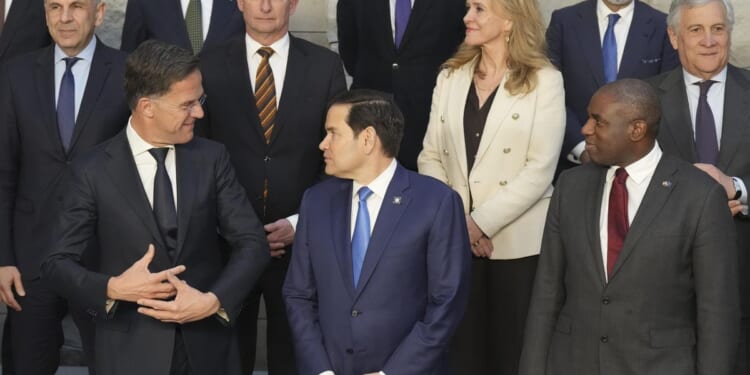
BRUSSELS | Secretary of State Marco Rubio and the Trump administration’s new envoy to NATO are seeking to reassure wary members of the U.S. commitment to the alliance.
Mr. Rubio on Thursday decried “hysteria and hyperbole” in the media about President Trump’s intentions, despite persistent signals from Washington that NATO as it has existed for 75 years may no longer be relevant.
Mr. Rubio and Matt Whitaker, the newly confirmed U.S. ambassador to NATO, were in Brussels for a meeting of alliance foreign ministers at which many are hoping Mr. Rubio will shed light on U.S. security plans in Europe.
“The United States is as active in NATO as it has ever been,” he told reporters as he greeted NATO Secretary-General Mark Rutte before the meeting began. “And some of this hysteria and hyperbole that I see in the global media and some domestic media in the United States about NATO is unwarranted.
“President Trump’s made clear he supports NATO,” Mr. Rubio said. “We’re going to remain in NATO.
“We want NATO to be stronger, we want NATO to be more visible and the only way NATO can get stronger, more visible is if our partners, the nation states that comprise this important alliance, have more capability,” he said.
Mr. Whitaker said in a statement that “under President Trump’s leadership, NATO will be stronger and more effective than ever before, and I believe that a robust NATO can continue to serve as a bedrock of peace and prosperity.”
But he added: “NATO’s vitality rests on every ally doing their fair share.”
Despite those words, European allies and Canada are deeply concerned by Mr. Trump’s readiness to draw closer to Russian President Vladimir Putin, who sees NATO as a threat as the U.S. tries to broker a ceasefire in Ukraine, as well as his rhetorical attacks and insults against allies such as Canada and Denmark.
Mr. Rubio and Danish Foreign Affairs Minister Lars Lokke Rasmussen met on the sidelines of the meeting. They didn’t respond to a shouted question about Greenland, a semi-autonomous territory in the Kingdom of Denmark that Trump has his eye on, but they smiled and shook hands in front of U.S. and Danish flags.
Mr. Trump’s imposition of new global tariffs on Wednesday, which will hit allies, also have added to the uncertainty and unease.
French Foreign Minister Jean-Noel Barrot warned that NATO’s unity is “being tested by the decisions taken and announced yesterday by President Trump.”
Asked about concerns among European allies about a possible U.S. troop drawdown and the importance of receiving clear messages from the Trump administration, Mr. Rutte said: “These issues are not new. There are no plans for them to all of a sudden draw down their presence here in Europe.”
Indeed, the Trump administration hasn’t made its NATO allies aware of any plans that it might have. But several European countries are convinced that U.S. troops and equipment will be withdrawn, and they want to find out from Mr. Rubio when and how many so they can fill any security gaps.
“We need to preempt a rapid retreat, but we’ve had nothing precise from the U.S. yet,” a senior NATO diplomat said before the meeting, briefing reporters on his country’s expectations on the condition that he not be named.
In Washington, Senate Armed Services Chairman Roger Wicker, Mississippi Republican, criticized “mid-level” leadership at the Pentagon for what he branded as a misguided plan to “reduce drastically” the number of U.S. troops based in Europe. The Defense Department hasn’t made public any such proposal.








